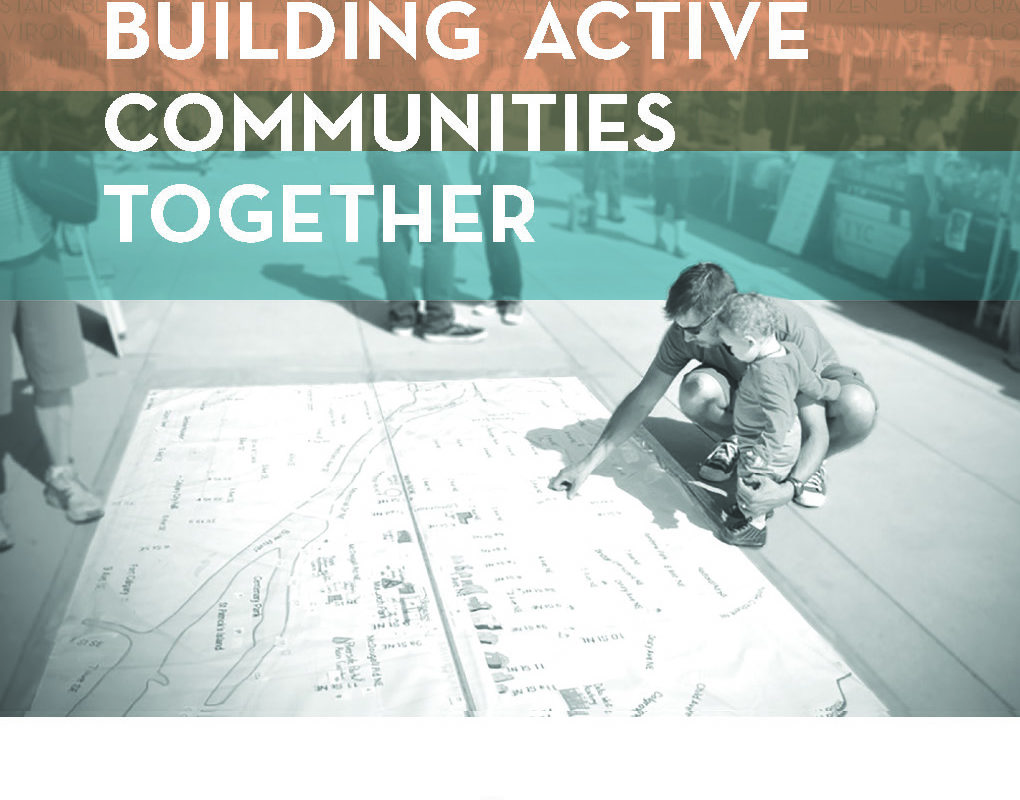
For immediate release: February 7, 2018
Today, Active Neighbourhoods Canada Network (ANC), a partnership between the Montréal Urban Ecology Centre (MUEC), Sustainable Calgary (SC) and The Centre for Active Transportation (TCAT), is launching its bilingual web platform urbanismeparticipatif.ca/participatoryplanning.ca.
Canadians are increasingly recognizing the importance of co-design, which meaningfully involves citizens in the planning of their communities. These innovative practices are transforming the way cities are developed and designed. Responding to growing demand, the new web platform offers tools, publications, studies, and resources to help new participatory planning and co-design projects succeed.
This platform is launched at a time when building healthy cities has become a national conversation. “The evidence is clear that how we build our cities affects our health. We are helping communities across the country to design active and healthy cities,” states Nancy Smith Lea, TCAT Director. Smith Lea’s remarks are echoed in the recent Report on the State of Public Health in Canada 2017. In this report, Dr. Theresa Tam, Canada’s Chief Public Health Officer, acknowledges ANC for its role in co-designing healthy Canadian communities.
Coinciding with the new website, TCAT is hosting a free panel discussion on Thursday February 8th at Ryerson University on Co-Designing the Active City. The event will also provide information about TCAT’s new course, titled “Planning Active Transportation” launching in March at Ryerson’s Chang School of Continuing Education. “This unique partnership with Ryerson University allows us to deliver professional training in this emerging field of study and paves the way for a more widespread adoption of new practices,” says Smith Lea. The 7-week course draws on over four years of participatory planning research and pilot projects across Ontario.
Knowledge transfer underlies the Active Neighbourhoods Canada project, with a goal to accelerate change and co-design active cities in urban, semi-urban and rural settings. “We tested and evaluated the participatory planning approach in 12 communities in three provinces, in order to build active living areas,” explains Noel Keough, SC president. “Now we want to emphasize these best practices and extend their reach. Influencing professional practices and public policy is one of the best ways to fast-track systemic change on a large scale.”
With our new bilingual web platform and university course, planning professionals and decision-makers have access to a vast array of tools, drawing on over 20 years of experience held by the three ANC partners. “Participatory planning leads to better projects that account for the realities of all community members, by fostering an approach that integrates knowledge sharing and citizen participation,” says Véronique Fournier, Executive Director of the MUEC. “We want this new web platform to serve as a toolbox that brings together the Canadian best practices in participatory planning.”
Upcoming Launch Event + Active Transportation and Co-Design Course
Co-Designing the Active City:
Date: Thursday February 8: 6:30-8:00 p.m.
Location: Chang School of Continuing Education, Ryerson University, 7th Floor, Peter Bronfman Learning Centre, 297 Victoria Street, Toronto
Description: Panel discussion and course launch info session. Toronto Star columnist and Spacing Magazine co-founder Shawn Micallef, Sabina Ali of the Thorncliffe Park Women’s Committee, and TCAT Director Nancy Smith Lea will share their diverse perspectives on the topic of Co-Designing the Active City.
Planning Active Transportation:
Date: March 8-April 19 (7 weeks)
Location: Chang School of Continuing Education, Ryerson University, Toronto
Description: TCAT’s Car Martin & Mikey Bennington will teach this course that explores participatory design and community engagement practices that contribute to the built environment in terms of health equity and provide the basis for planning streets and public spaces. Case studies will be used to identify challenges and opportunities found in designing for pedestrians and cyclists across a range of environments. The course is designed for built environment professionals and students across a range of disciplines.
About Montreal Urban Ecology Centre
The Montréal Urban Ecology Centre (MUEC) is a non-profit organization that proposes practices and policies to create ecological, democratic and healthy cities. For over 20 years, the MUEC has helped thousands of citizens, organizations and decision-makers take an active part in the urban planning of their neighbourhoods and decision-making around urban issues.
About Sustainable Calgary
Sustainable Calgary works to promote, encourage and support community-level actions and initiatives that move Calgary towards a sustainable future. In the context of our urban lives, we define sustainable development as the process of working towards the long-term health and vitality of our city and its citizens with regard to ecological, social, cultural and economic processes.
About the The Centre for Active Transportation
The Centre for Active Transportation (TCAT), a project of Clean Air Partnership (CAP), advances knowledge and evidence to build support for safe and inclusive streets for walking and cycling. We believe that active transportation plays a critical role in creating environmentally and economically sustainable cities.
This project was made possible by financial support from the Public Health Agency of Canada (PHAC). The opinions expressed herein do not necessarily reflect the official position of PHAC.
